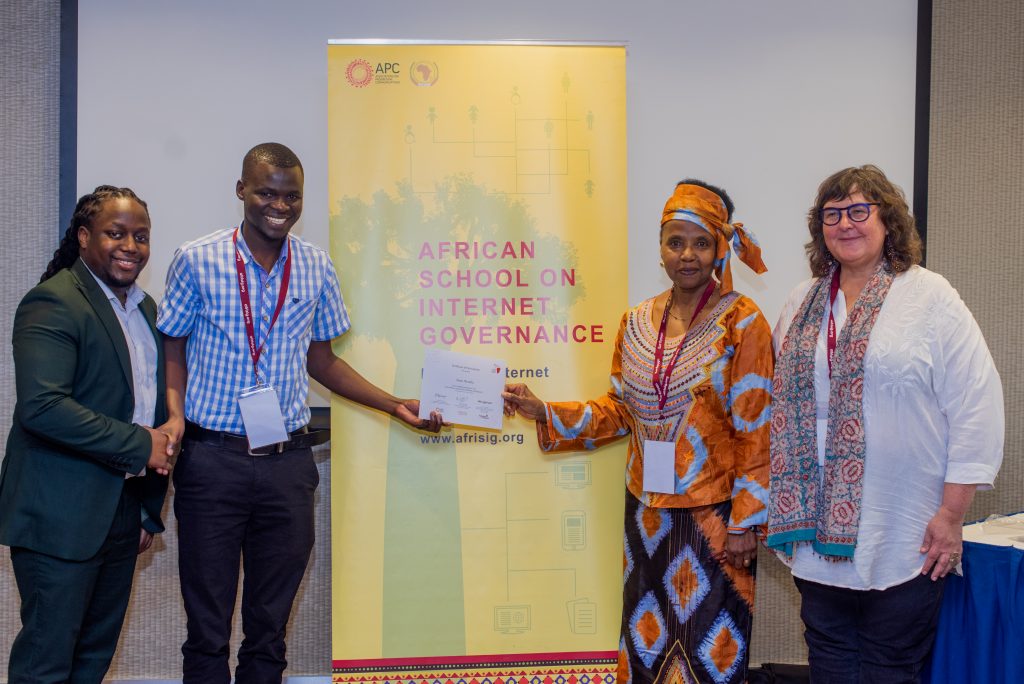
By Amuku Isaac
I was excited to be considered as a fellow for the 2023 African School on Internet Governance (AfriSIG), held in Abuja, Nigeria from 13 to 18 September 2023. This opportunity introduced me to learning more about the biggest challenges in governance of the internet, which include the huge paradox of the gender digital divide, the application of a human rights approach in laws and policy making, and the best approach to employ in order to involve everyone in internet governance, since a lack of involvement may lead to exclusions.
The practicum at this year’s AfriSIG focused on the African Union Data Policy Framework. The Framework’s vision is to use data to empower all African countries, improve people’s lives, safeguard collective interests, protect (digital) rights, and drive equitable socioeconomic development. During the practicum session, I decided to join the civil society organisations (CSOs), because it was my first time hearing about this Data Policy Framework, yet the work of CSOs involves a lot of data collection and research. This makes participation in the governance of data the most important aspect of our work as CSOs, because of rapid digitalisation and the need for evidence-based policy advocacy.
Internet governance and data being a public good, in my perspective, means that everyone must enjoy the full benefits from them without diminishing the benefits that are enjoyed by others regardless of their geographical location or social and economic status. This is the first point for all Africans to solve African problems, because the internet is an enabler, and an efficient flow of data across borders will enable equal distribution of benefits to everyone while reducing risks and violation of human rights.
I am now better prepared to engage in practical negotiations with internet and data actors at global, continental, regional and national level because of lessons learned and networks created during my participation in AfriSIG 2023. Some of the major challenges that I will carry forward from the fellowship include fostering the implementation of the African Union Data Policy Framework practicum recommendations; raising awareness on why the internet is important for social, political and economic development in Africa; championing the use of a multistakeholder approach in policy making; mainstreaming human rights and gender into internet governance; and highlighting challenges and opportunities for green transition. I also learned more about artificial intelligence policy and regulations, the UNESCO Internet Universality Indicators, and cybersecurity and cybercrime.
At the time of writing this blog post, I was well energised and preparing to use this knowledge to participate in the 18th Internet Governance Forum 2023 taking place in Kyoto, Japan in October, and other internet governance and data spaces.
My participation in such spaces has the potential to contribute to empowerment in Africa because internet and data are public goods that everyone must have full access to and benefit from.
Amuku Isaac is the Monitoring and Evaluation Officer at Women of Uganda Network (WOUGNET). WOUGNET is a legally registered non-governmental organisation initiated in May 2000 by several women’s organisations in Uganda to develop the use of information and communication technologies (ICTs) among women as tools to share information and address issues collectively. It is also an APC member organisation. For the last six years, Amuku has been conducting research in ICT, online gender-based violence, agriculture, digital security and online safety, digital rights, policy and regulation. He is part of the internet governance community and has participated in national, regional, continental and global internet governance fora. Amuku has organised high-level dialogues with policy makers, regulators, government ministries and marginalised groups such as women, girls, persons with disabilities and people who live in rural areas to discuss issues of digital human rights, specifically women’s rights online using the Feminist Principles of the Internet and the African Declaration on Internet Rights and Freedoms.
